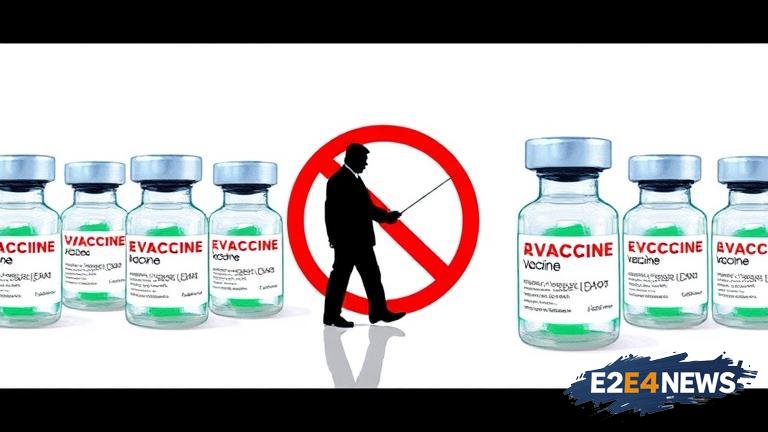The ongoing debate over vaccine safety and efficacy has taken a new turn with Robert F. Kennedy Jr.’s anti-vaccine strategy potentially forcing vaccine manufacturers to reconsider their presence in the market. According to recent reports, several major vaccine manufacturers have warned that they may be compelled to stop producing vaccines if Kennedy’s efforts continue to gain traction. This development has sparked concerns among health experts and officials, who fear that a reduction in vaccine availability could have severe consequences for public health. Kennedy’s organization, Children’s Health Defense, has been at the forefront of the anti-vaccine movement, advocating for greater scrutiny of vaccine safety and pushing for policy changes that could limit vaccine access. While Kennedy’s efforts have been met with resistance from the scientific community, his message has resonated with some parents and individuals who are skeptical of vaccine efficacy. The potential exit of vaccine manufacturers from the market could lead to shortages of critical vaccines, including those for diseases such as measles, mumps, and rubella. This, in turn, could result in a resurgence of preventable diseases, posing a significant threat to public health. Health officials have long emphasized the importance of vaccines in preventing the spread of infectious diseases, and the potential consequences of a vaccine shortage are dire. The Centers for Disease Control and Prevention (CDC) has consistently stated that vaccines are safe and effective, and that the benefits of vaccination far outweigh the risks. Despite this, Kennedy’s anti-vaccine movement has gained momentum, with some states considering legislation that would limit vaccine access. The vaccine manufacturers’ warning comes as a response to Kennedy’s efforts, which they believe could ultimately lead to a decline in vaccine demand and an increase in liability concerns. The manufacturers argue that the current regulatory environment, combined with the growing anti-vaccine sentiment, makes it increasingly difficult for them to continue producing vaccines. If vaccine manufacturers were to exit the market, it could have far-reaching consequences for global health, as many countries rely on these manufacturers for their vaccine supplies. The World Health Organization (WHO) has expressed concerns over the potential impact of vaccine shortages on global health security. In response to the manufacturers’ warning, health officials and experts are urging policymakers to take a stand against anti-vaccine misinformation and to support efforts to promote vaccine confidence. The CDC and other health organizations have launched initiatives to educate the public about the importance of vaccines and to address common misconceptions about vaccine safety. Meanwhile, Kennedy’s organization has continued to push for greater scrutiny of vaccine safety, despite the overwhelming scientific evidence supporting the efficacy and safety of vaccines. As the debate over vaccine safety and efficacy continues, it is essential to consider the potential consequences of a vaccine shortage and to support efforts to promote vaccine confidence. The role of vaccine manufacturers in ensuring global health security cannot be overstated, and their warning serves as a stark reminder of the need for continued investment in vaccine research and development. Ultimately, the decision to vaccinate or not vaccinate is a personal one, but it is crucial that individuals make informed decisions based on scientific evidence rather than misinformation. By promoting vaccine confidence and supporting efforts to improve vaccine access, we can work towards a future where preventable diseases are a rarity, and public health is protected. The ongoing debate over vaccine safety and efficacy serves as a reminder of the importance of continued investment in vaccine research and development, as well as the need for effective communication and education strategies to promote vaccine confidence. As health officials and experts continue to navigate the complex landscape of vaccine policy and advocacy, it is essential to prioritize the safety and well-being of individuals and communities around the world.
